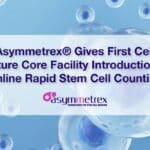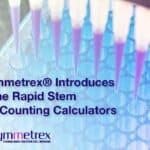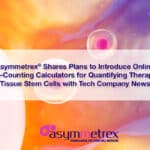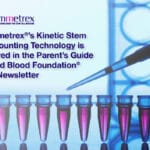On October 2, 2019, the United Kingdom Intellectual Property Office issued a patent to Massachusetts stem cell biotechnology company Asymmetrex. The patent covers the company’s invention of the first and only technology for counting tissue stem cells specifically and identifying agents that affect tissue stem cells, positively or negatively. The new patent is another advance in Asymmetrex’s ongoing development of its AlphaSTEM Test™ technology as the solution to the longstanding unmet need for stem cell-specific counting in stem cell research, stem cell medicine, and drug development.
Today, Massachusetts stem cell biotechnology company Asymmetrex announces the recent patenting in the U.K. of its lead development technology. Like the company’s precursor patent, approved in the U.S. in 2017, the new patent covers the company’s unique technology for specific and accurate counting of tissue stem cells. Asymmetrex now markets the technology in the U.S. as the AlphaSTEM Test™. The new patent will support marketing and sales and investor development initiatives in the U.K.
Asymmetrex’s AlphaSTEM Test™ is the first and only technology to provide specific and accurate counting of tissue stem cells, both from mature adult tissues and perinatal tissues like the umbilical cord. By counting tissue stem cells specifically, the technology can determine the stem cell-specific dose of tissue stem cell treatments. The lack of this crucial information has limited progress in stem cell clinical trials that largely cannot be interpreted without it. Even currently approved stem cell treatments would benefit from stem cell-specific dose information. For example, in the case of bone marrow stem cell transplants, for which donors are scarce, knowing the stem cell-specific dose might allow additional patients to be treated with the same bone marrow donation.
Some areas of stem cell research and stem cell medicine have been slow to embrace the new technology. This is particularly true of companies that presently market isolated, manufactured, or cultured tissue stem cell-containing products, whether for research purposes or for patient treatments. Many have been unwilling to use the new technology to begin certifying the stem cell-specific count or dose of their products. Asymmetrex founder and director James L. Sherley, M.D., Ph.D., chides that this condition cannot persist. “It was one thing to be selling products with no stem cell number or dose, when it was not possible to determine the stem cell-specific count. But it’s a whole other thing, when it is now possible. Change is here.”
Specific stem cell counting is a less clouded issue for academic stem cell research labs. Basic research investigators would like to know how many stem cells are in their experiments. Accordingly, Asymmetrex is presently beta-testing the use of the technology in both U.S. and U.K. labs to position the technology to be more practical and affordable for stem cell investigators in colleges and universities.
There are two other broad categories of applications for the stem cell counting technology that often are not self-apparent. Gene therapy, including emerging gene editing, would benefit from tissue stem cell-specific counting. Because of their long-lived tissue renewing property, stem cells are the crucial targets for gene modifications to achieve single-dose, durable cures. Current clinical studies attempt gene therapy while blind to the number of stem cells during genetic modification procedures, as well as blind to the dose of genetically-modified stem cells in the final treatments.
Both Asymmetrex’s U.S. and U.K. patents cover the use of the stem cell counting technology to identify drug candidates that alter stem cells, whether with beneficial effects or detrimental effects. Drugs with beneficial effects may have efficacy for accelerating or improving tissue repair of wounds and injuries. Drug candidates with detrimental effects have even greater significance in drug development. Tissue stem cell-toxic agents cause chronic organ failures, like bone marrow or liver. This problem is estimated to be responsible for half of drug failures due to unacceptable toxicity, which are a major cause of unsuccessful drug programs. Previously, without a way to do inexpensive stem cell toxicity testing, U.S. pharmaceutical companies spent $4-5 billion each year watching these drugs fail in animal studies or subsequent clinical trials. By showing that its AlphaSTEM Test™ can identify drugs known to cause chronic organ failure, Asymmetrex is positioning itself to relieve the pharmaceutical industry of this huge cost burden with a simple, inexpensive cell culture test.
Later this month, Asymmetrex will begin a podcast series to expand and accelerate education of the inevitability of the change of stem cell research, stem cell medicine, stem cell manufacturing, and drug development to quantitative analyses for tissue stem cells. Earlier this year, the FDA Standards Coordinating Body (SCB) listed stem cell specific-dose determination as a priority for needed standards for regenerative medicine and stem cell therapies. Dose is a fundamental principle for the discovery, development, and administration of quality medicines. Sherley assures, “It can be no different for stem cell medicine. Our podcast will not just target the stem cell medicine and pharmaceutical industry. We also wish to inform the end users of stem cell products, patients, their families, and their advocates, including the FDA. When they understand and demand certification of the quality and dose of stem cells in their treatments, the industry will speed up its adoption of the change that must come.”
Asymmetrex, LLC is a Massachusetts life sciences company with a focus on developing technologies to advance stem cell medicine. Asymmetrex’s founder and director, James L. Sherley, M.D., Ph.D. is an internationally recognized expert on the unique properties of adult tissue stem cells. The company’s patent portfolio contains biotechnologies that solve the two main technical problems – production and quantification – that have stood in the way of successful commercialization of human adult tissue stem cells for regenerative medicine and drug development. In addition, the portfolio includes novel technologies for isolating cancer stem cells and producing induced pluripotent stem cells for disease research purposes. Asymmetrex markets the first technology for determination of the dose and quality of tissue stem cell preparations (the “AlphaSTEM Test™”) for use in stem cell transplantation therapies and pre-clinical drug evaluations.







Leave a Reply